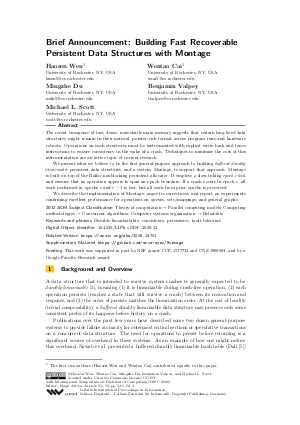Brief Announcement: Building Fast Recoverable Persistent Data Structures with Montage
Authors Haosen Wen, Wentao Cai, Mingzhe Du, Benjamin Valpey, Michael L. Scott
-
Part of:
Volume:
34th International Symposium on Distributed Computing (DISC 2020)
Part of: Series: Leibniz International Proceedings in Informatics (LIPIcs)
Part of: Conference: International Symposium on Distributed Computing (DISC) - License:
 Creative Commons Attribution 3.0 Unported license
Creative Commons Attribution 3.0 Unported license
- Publication Date: 2020-10-07
File

PDF
LIPIcs.DISC.2020.52.pdf
- Filesize: 316 kB
- 3 pages
Document Identifiers
Related Versions
Subject Classification
ACM Subject Classification
- Theory of computation → Parallel computing models
- Computing methodologies → Concurrent algorithms
- Computer systems organization → Reliability
Keywords
- Durable linearizability
- consistency
- persistence
- fault tolerance
Metrics
- Access Statistics
-
Total Accesses (updated on a weekly basis)
0Document
0Metadata
Abstract
The recent emergence of fast, dense, nonvolatile main memory suggests that certain long-lived data structures might remain in their natural, pointer-rich format across program runs and hardware reboots. Operations on such structures must be instrumented with explicit write-back and fence instructions to ensure consistency in the wake of a crash. Techniques to minimize the cost of this instrumentation are an active topic of current research. We present what we believe to be the first general-purpose approach to building buffered durably linearizable persistent data structures, and a system, Montage, to support that approach. Montage is built on top of the Ralloc nonblocking persistent allocator. It employs a slow-ticking epoch clock, and ensures that no operation appears to span an epoch boundary. If a crash occurs in epoch e, all work performed in epochs e and e-1 is lost, but all work from prior epochs is preserved. We describe the implementation of Montage, argue its correctness, and report on experiments confirming excellent performance for operations on queues, sets/mappings, and general graphs.
Cite As Get BibTex
Haosen Wen, Wentao Cai, Mingzhe Du, Benjamin Valpey, and Michael L. Scott. Brief Announcement: Building Fast Recoverable Persistent Data Structures with Montage. In 34th International Symposium on Distributed Computing (DISC 2020). Leibniz International Proceedings in Informatics (LIPIcs), Volume 179, pp. 52:1-52:3, Schloss Dagstuhl – Leibniz-Zentrum für Informatik (2020)
https://doi.org/10.4230/LIPIcs.DISC.2020.52
BibTex
@InProceedings{wen_et_al:LIPIcs.DISC.2020.52,
author = {Wen, Haosen and Cai, Wentao and Du, Mingzhe and Valpey, Benjamin and Scott, Michael L.},
title = {{Brief Announcement: Building Fast Recoverable Persistent Data Structures with Montage}},
booktitle = {34th International Symposium on Distributed Computing (DISC 2020)},
pages = {52:1--52:3},
series = {Leibniz International Proceedings in Informatics (LIPIcs)},
ISBN = {978-3-95977-168-9},
ISSN = {1868-8969},
year = {2020},
volume = {179},
editor = {Attiya, Hagit},
publisher = {Schloss Dagstuhl -- Leibniz-Zentrum f{\"u}r Informatik},
address = {Dagstuhl, Germany},
URL = {https://drops.dagstuhl.de/entities/document/10.4230/LIPIcs.DISC.2020.52},
URN = {urn:nbn:de:0030-drops-131304},
doi = {10.4230/LIPIcs.DISC.2020.52},
annote = {Keywords: Durable linearizability, consistency, persistence, fault tolerance}
}
Author Details
Funding
This work was supported in part by NSF grants
CCF-1717712 and CNS-1900803, and by a Google Faculty Research award.
Supplementary Materials
References
-
W. Cai, H. Wen, H. A. Beadle, C. Kjellqvist, M. Hedayati, and M. L. Scott. Understanding and optimizing persistent memory allocation. In 19th Intl. Symp. on Memory Mgmt., June 2020.

-
S. Haria, M. D. Hill, and M. M. Swift. MOD: Minimally ordered durable datastructures for persistent memory. In 25th Intl. Conf. on Arch. Support for Prog. Lang. and Op. Sys., pages 775-788, March 2020.

-
J. Izraelevitz, H. Mendes, and M. L. Scott. Linearizability of persistent memory objects under a full-system-crash failure model. In Intl. Symp. on Dist. Comp., pages 313-327, September 2016.

-
A. Memaripour, J. Izraelevitz, and S. Swanson. Pronto: Easy and fast persistence for volatile data structures. In 25th Intl. Conf. on Arch. Support for Prog. Lang. and Op. Sys., pages 789-806, March 2020.

-
F. Nawab, J. Izraelevitz, T. Kelly, C. B. Morrey III, D. R. Chakrabarti, and M. L. Scott. Dalí: A periodically persistent hash map. In Intl. Symp. on Dist. Comp., pages 37:1-37:16, October 2017.

-
Yoav Zuriel, Michal Friedman, Gali Sheffi, Nachshon Cohen, and Erez Petrank. Efficient lock-free durable sets. Proc. ACM Program. Lang., 3(OOPSLA), October 2019.

